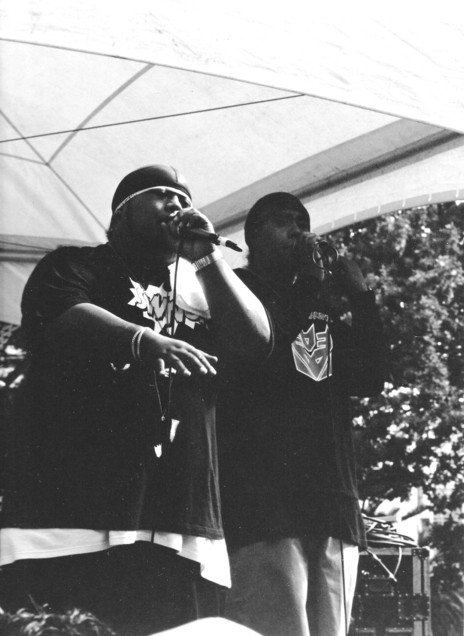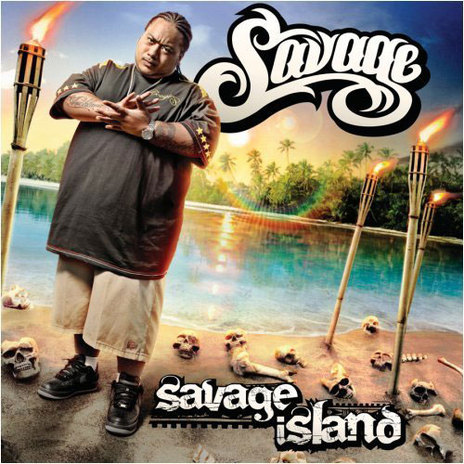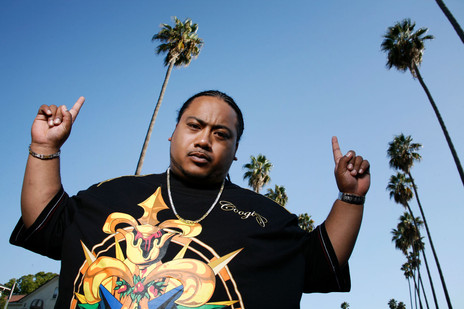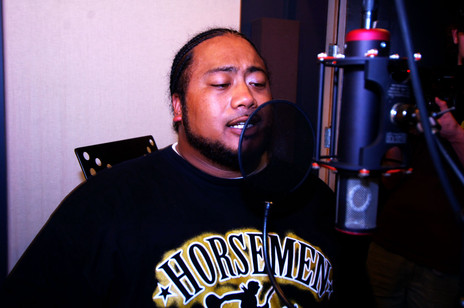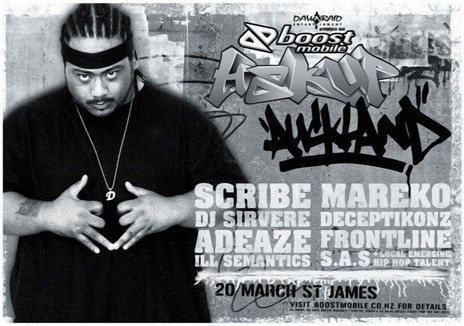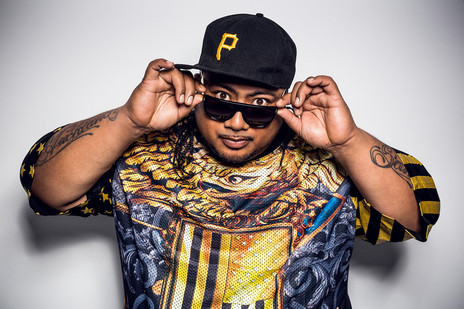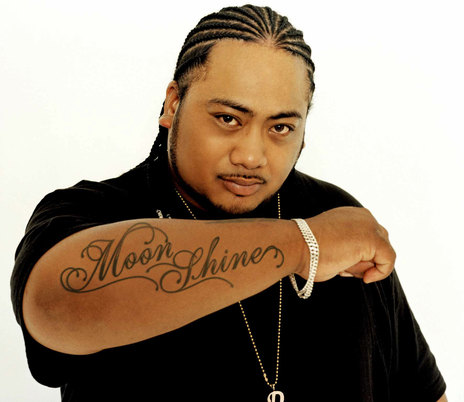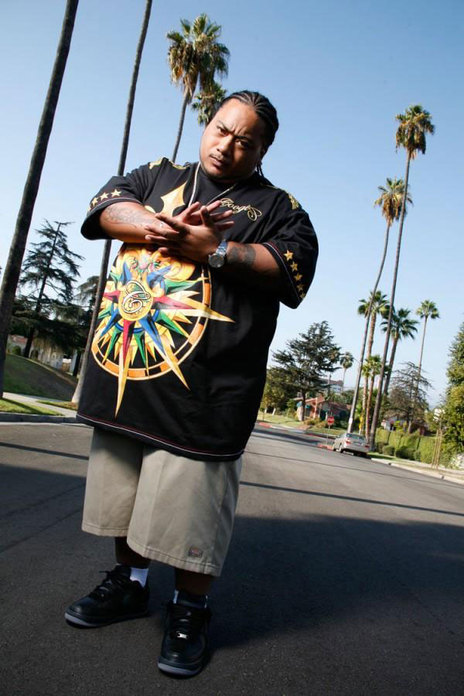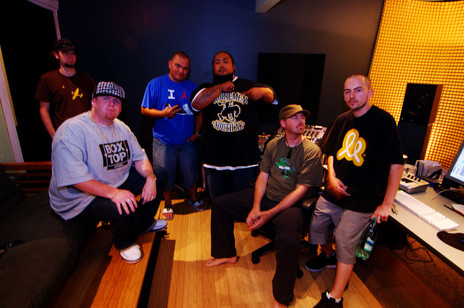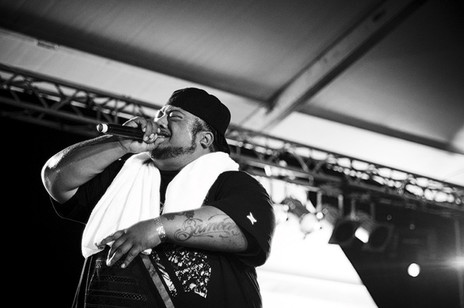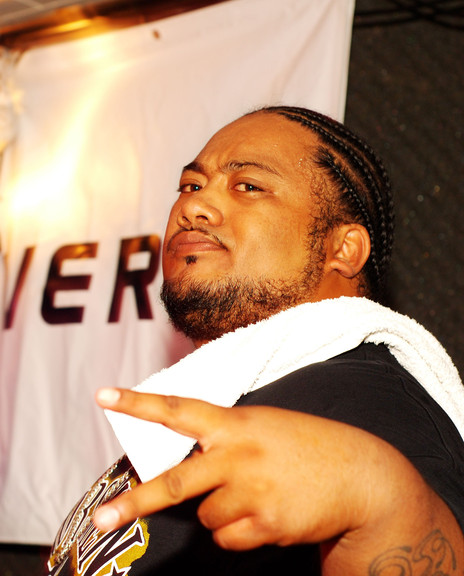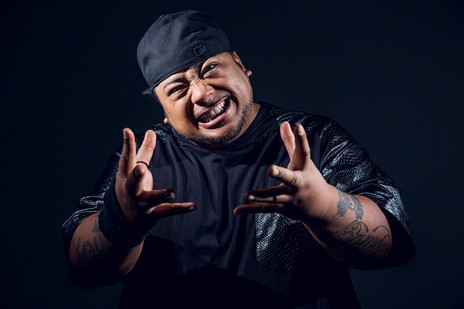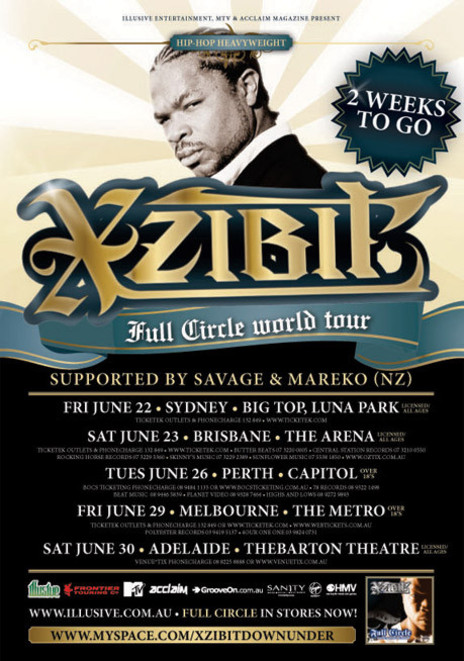Savage (Demetrius Savelio) grew interested in hip hop at a very early age, as he explained to Radio Burger Fuel: “My older brother was always playing hip hop tunes. The first time I ever saw Samoans on TV was the Boo-Yaa T.R.I.B.E., back in the 80s, when I was in primary school. I went to walk out, leave home and the TV was playing – the Boo-Yaa T.R.I.B.E. were on TV. I stayed and watched the video clip. I walked to school singing the song. It clicked that me being a Samoan and wanting to do music was possible. When they first came to New Zealand ... they performed at the town hall and it was an honour and a privilege to open up for them [at Fresh Fest 2001]. Then going to meet with them in Australia. When I first went to LA, I caught up with the Boo-Yaa family as well.”
Savage wrote his first verse at 11 years old after being inspired by listening to the young rap duo, Kriss Kross. He was discouraged by the reaction of other kids at school, so it wasn’t until a few years later that his desire to rap was renewed by hearing his cousin, Dez Leota (aka RAYZE), rapping in K.A.O.S (one of the first acts to sign to Dawn Raid). Another cousin, Mareko (Mark Sagapolutele), was also interested in rapping and Savage practised with him in their first years at James Cook High School. However, Mareko eventually changed school to Papakura High, though he stayed in touch and eventually Savage joined him in his new group, Deceptikonz (along with Devolo and Alphrisk).
In the interim, Savage had gone through a dark period after being kicked out of James Cook – a time that he later recounts in his track, ‘Set Me Free’, with the chorus line: “I don’t wanna die, I don’t wanna live.” Fortunately, he regained his belief in himself through his religious faith and finished his schooling at Wesley College. The Deceptikonz began rapping at parties around Manurewa and distinguished themselves with their use of punchlines and metaphors. “A lot of people who were rapping back then were into gangsta rap,” Savage recalls. “We’d just turn up at parties and make fun of them.”
Mareko had shared some early tracks via the New Zealand hip hop forum and they gained early respect from their peers. Through Savage’s family connection to K.A.O.S, they were able to get a demo to Dawn Raid and were signed to the label in 1999. Two years later, The Deceptikonz appeared both on the Dawn Raid compilation, Southside Story II, and P-Money’s breakthrough album, Big Things (2002).
From the start, Savage’s vocal delivery had a unique guttural growl.
The debut album by the Deceptikonz, Elimination (2002), saw the group bursting out from the underground hip hop community, hitting No.4 on the album charts.
From the start, Savage’s vocal delivery had a unique guttural growl to it, which would become his trademark in the years that followed. Though he also showed he could do a track with heart: on ‘Broken Home’ he took aim at his father, who had abandoned his family at an early age, leaving his mother to care for him and his siblings.
Dawn Raid’s focus in 2003 was the solo album released by Mareko, but Savage kept working hard to prove himself on the scene. Over this period, he took place in a number of Major Flavours tours with Sir-Vere, which put him in front of large audiences throughout the country and he had his own solo freestyle on Major Flavours 2 (2002).
Sir-Vere commented at the time: “Personally at the moment, my favourite person in hip hop in New Zealand is Savage from Deceptikonz because I just love his style. Among the SAS DJs – me, Ali and Shan – we consider Savage to be our swingman [a player who can take multiple positions]. When we go away, it’s good to have Savage with us. If any shit gets out of hand, he’s always there. When it comes to the mic, he’s the most versatile – he can do party rhymes, he can do battle rhymes. He’s the man, bro. Everything about him, the way he dresses, he’s dope.”
During 2003, Savage appeared on a run of singles that pushed him forward as an individual talent. First up was the Deceptikonz track, ‘Stop, Drop, and Roll’, released to promote Mareko’s album. Savage showed his talent calling out an energetic hook, as well as taking the first verse on the track, which reached No.6. Even more striking was his appearance alongside Scribe and Con Psy (aka David Dallas) on the smash hit, ‘Not Many (The Remix)’, which got to No.2 at home and No.21 in Australia. Savage showed off both the street edge to his rapping (“cut the bullshit / before I rock your face with pool stick”) and his sense of humour (ending the track by calling out “Can you please give it up for Savage?”).
When Deceptikonz took part in the extensive Hook Up tour of New Zealand in 2004, Savage rapped a verse on the accompanying television ads and provided the track’s main hook (it was released as a single and went into the Top 10). Over the course of two years, he’d gone from being an underground rapper to being one of the most recognisable artists in the country. Savage knew he had to strike quickly to capitalise on his sudden moment of notoriety.
Dawn Raid’s u.s. CONTACT was Kirk Harding, AN EXPAT who approachED Akon on Savage’s behalf.
His first solo single, ‘Swing’, was over a beat created by Beat Kamp Muzik – Nate D (Nathan Holmes) and Adeeze Alavante (Adeeze Ngawhika). The minimal beat was driven by a super-catchy sub bass and thudding snare hit, which mostly repeats throughout the entire song with other elements dipping in and out to add flavour (808 hi-hats and other percussion effects).
The sparseness of the track meant Savage had to push the chorus out the front himself, which he does by delivering the word “swing” in an unexpectedly high voice – creating a hook unto itself. It was perfect material for the club and the accompanying music video saw a laundromat in South Auckland suddenly switch into a late night dance floor. New Zealand hip hop was in its golden years so this was the perfect single at the perfect time – it spent five weeks at No.1 and also dipped into the Australian Top 40.
The creation of Savage’s next single was partly a matter of serendipity. While Mareko had been recording his album in New York, he was given an unreleased CD by then-unknown singer, Akon. He passed it onto Savage, who was amazed by the recording. Dawn Raid’s contact in New York was an expat New Zealander, Kirk Harding, who made an approach to Akon on Savage’s behalf. Akon not only agreed to the collab, but provided a beat complete with hook for Savage to write on – this was ‘Moonshine’, which entered the Top 10 in Australia and went to No.1 in NZ (helping his album of the same name to a No.2 slot). Savage was now up there with Scribe and Nesian Mystik as one of New Zealand’s top acts: he headlined the second Hook Up tour and showed his crossover appeal by appearing at Edgefest.
These hits allowed Savage’s debut album, Moonshine (2005), to reach No.2 in New Zealand. He was also getting his first taste of the international hip hop scene – the majority of the beats on the album had been produced by Sol Messiah (who previously produced beats for Dead Prez and Nappy Roots, and would later work with David Banner and Chamillionaire). While in New York filming the video for ‘Moonshine’ with Akon, Kirk Harding got Savage an invite to the 30th birthday party of Raekwon from Wu Tang Clan. His success in Australia continued with a slower track, ‘They Don’t Know’, which reached No.26 and featured the new Dawn Raid star Aaradhna singing the hook (it went to No.3 at home).
His biggest break came when ‘Swing’ was used in the movie ‘Knocked Up’.
It would be a few years before Savage released another album, but he hardly rested on his laurels. There was another Deceptikonz album, Heavy Rotation (2006), and tours of Australia in support of US heavyweights The Game and Xzibit. Yet his biggest break came when ‘Swing’ was used in the smash movie, Knocked Up (2007), as well as a later slot in Step Up 3 (2010).
Dawn Raid had a strong relationship with Universal Music in New Zealand and now the head office in the US was keen to develop Savage further. This connection helped Dawn Raid synch further songs for the movie Superbad: ‘Capital S.A.’ by Alphrisk featuring Savage, and ‘My Lady’ by Mareko. ‘Swing!’ was re-released with remix versions that featured rising US stars such as Pitbull and Soulja Boy (the latter was featured on the US compilation, Now That’s What I Call Music! 29, which sold platinum in the US). These versions pushed the number of purchased downloads of ‘Swing!’ past two million units (and it would later surpass 14 million streams on Spotify).
The high-profile featured acts didn’t stop there: Mexican-American rapper Baby Bash had already had a US Top 20 hit when he appeared on Savage’s ‘Wild Out (Chooohooo)’. It went to No.6 in New Zealand and helped Savage put a second album in the local Top 10: Savage Island (2008). Although the album didn’t spawn any further international hits, it did see Savage being interviewed in Source – the biggest hip hop magazine in the US – and he continued searching for his next break there.This breakthrough allowed Savage to join the US touring circuit and he spent long periods in New York and, in particular, LA. Savage Island was recorded in Atlanta and featured the two remix versions of ‘Swing’. Yet the prime spot on the album was saved for the group that first inspired him to rap – the album opener was ‘Knock A Hater Out’ featuring Boo-Yaa T.R.I.B.E.
THE ‘SWING’ BREAKTHROUGH ALLOWED SAVAGE TO JOIN THE US TOURING CIRCUIT.
Savage’s next album, Mayhem and Miracles (2012), was recorded primarily in North Hollywood, California; he was based nearby. It was as solid as its predecessors but saw decreasing returns from ploughing the same territory: it dipped in the New Zealand charts, reaching No.26 for only one week. There was a run of singles that showed his range – the club banger, ‘Twerk’, the heartfelt upbringing tale ‘Because of You’, and the street rap ‘Come Out’ – but none managed to reach beyond his core audience. He needed a new direction.
Savage was given an indication of where to head next when Melbourne DJ, Joel Fletcher, scored a massive hit with a new remix of ‘Swing’ (going four times platinum in Australia). This led to Savage being approached by a well-revered figure from the Australian dance scene, Timmy Trumpet, who had a reputation for mixing jazz elements into his house music tracks. Their collaboration produced the monster hit, ‘Freaks’, which got to No.3 in Australia (staying on the charts 29 weeks) and hit No.1 in New Zealand in mid-2014. Eventually the track surpassed one billion streams.
‘Freaks’ was nominated for Song of the Year at the ARIA Awards but didn’t make the short list for Single of the Year in New Zealand (despite being named “top selling single”). This perhaps showed the degree to which Savage was already morphing into an Australian star. Savage was considering moving further into dance music by approaching the top dog label, Ministry of Sound Australia, then – out of the blue – they got in touch with him instead. Fortunately, Dawn Raid was supportive and released him from his contract so he could ink the new deal, which included signing to their well-connected publishing wing 120 Publishing, and their management/touring company, Soapbox Artists.
By this stage, Savage was living back in New Zealand with his three children, but knew he had to keep a connection with his Australian fans. He did this by re-working his live act to present himself more as a DJ who could play the clubs as a solo act, while always keeping a mic handy to drop raps or pump up the crowd. His focus switched to singles rather than albums, which was a savvy move: his 2018 track, ‘Deja Vu’ (with Timmy Trumpet), racked up 1.7 million Spotify streams. In the meantime ‘Freaks’ had been certified gold in the US. Having such big singles always means there is an opportunity for big synch deals too. In 2017, he guested on ‘Push’ by Kronic and Far East Movement, and it was picked up for the movie, The Fate of The Furious. ‘Push’ even gained a slot in the trailer, which was seen by 110 million viewers during the halftime break of the Superbowl.
It may have been a long time coming, but it’s now safe to say that Savage is the most successful rapper that New Zealand has ever produced. And he shows no signs of stopping any time soon.
